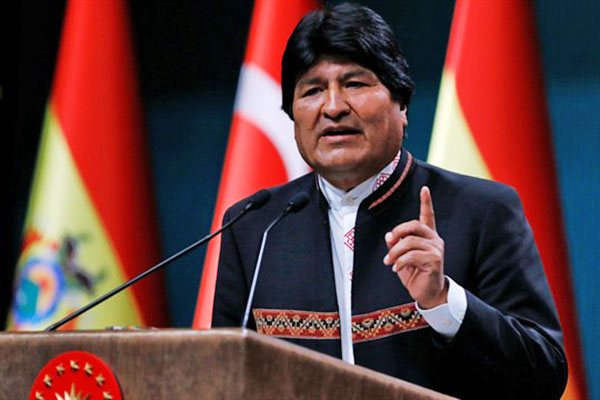|
April 22, 2019 from WorldPoliticsReview Website
Bolivian President Evo Morales speaks during a joint press conference with Turkish President Recep Tayyip Erdogan, Ankara, Turkey, April 9, 2019
(AP photo by Burhan Ozbilici).
After the boom came the
bust, and with it widespread voter dissatisfaction. Where free
elections have been held, most of the region has subsequently swung
to the right.
President Nicolas Maduro, who came to office in 2013 as the handpicked successor of the leader who launched the wave, Hugo Chavez, continues to preside over one of the worst economic and humanitarian disasters in recent Latin American history.
He's still claiming to be
some kind of revolutionary.
Morales is an ideological brother-in-arms to Maduro. There is a temptation to see the two men and their political trajectories as similar, and there are certainly points of comparison.
But the differences are
more revealing.
In some ways, Bolivia and Venezuela are heading in entirely opposite directions.
Once wealthy and middle-class, Venezuela is crashing headlong into poverty, while Bolivians are quietly getting modestly wealthy.
There is an economic policy story behind these numbers.
But the similarities end there...
Although there have been allegations of corruption in Bolivia, including some involving the notorious Brazilian construction giant Odebrecht, the scams seem to have been on a smaller scale.
And perhaps most of all, despite spending on some expensive prestige projects like a new government headquarters in La Paz, Bolivia under Morales maintained a budget surplus up until 2013, and in subsequent years has sought to control the size of the deficit.
This is a world away from
Venezuela printing ever-more money in order to cover uncontrolled
deficits, which in turn has fed relentless hyperinflation.
as a result of deep social changes
that he helped
initiate...
The end of the commodities boom has taken a toll. The country now has double deficits - a fiscal deficit of around 7 percent of GDP, and a current account deficit of around 5 percent of GDP.
Foreign currency reserves are half what they were in the boom years, which peaked in 2014, and debt has increased, although it is still manageable. Absent sustained export growth, Bolivia could face a future currency crisis.
But that can be said of
many post-commodities boom countries in Latin America.
Back in 2006, Jorge Castañeda outlined a taxonomy of Latin America's "left-wing resurgence," categorizing it not as one but two Latin American lefts.
There was also a parallel distinction between leftist leaders who were genuinely committed to democracy and term limits, and those addicted to holding on to power at all costs.
Venezuela remains a clear case of Castañeda's second category:
Morales may look more
like the first category, given his positive economic record, but his
story is not yet finished.
But Morales can only run again because of his own populist and even authoritarian impulses.
He didn't take no for an answer when 51 percent of voters rejected a change to the constitution, by a referendum held in February 2018, that would have allowed him to seek a fourth consecutive term.
Morales instead orchestrated a ruling by the pliant Supreme Electoral Tribunal that has allowed him to do just that, on the dubious grounds that his political rights would otherwise be violated.
His move mirrored Juan
Orlando Hernandez, the autocratic right-wing ruler of Honduras,
who arranged his own unconstitutional re-election on similar grounds
last year.
The answer may lie with Bolivia's new middle class. Those who emerged from poverty thanks to the economic policies of Morales and his party might remain loyal to him. Yet that is not what happened in neighboring Brazil.
The middle class there grew rapidly as poverty fell during the rule of the left-wing Workers' Party, from 2003 to 2016.
But the new middle class
disliked poor public services and widespread corruption and crime.
It came out on the streets and ultimately voted the government out.
It may turn out that Morales misjudged the right time to leave office.
If so, he would hardly be
alone among Latin American presidents, from the left to the right,
who have been seduced by the temptation to hold on to power, seeking
re-election after re-election.
|


